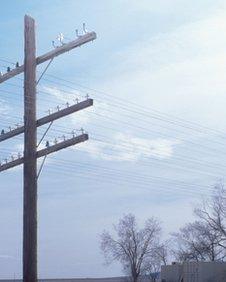Google Fiber to offer fast net access in Austin, Texas
- Published

The service in Kansas City is delivered mainly by overhead cables
Google has confirmed that it will be extending its super-fast fibre broadband service to Austin, Texas.
Currently the search giant has limited its roll-out to Kansas City, where residents can get up to one gigabit per second speeds for $70 (拢44) per month.
In December Google chairman Eric Schmidt said the firm was looking for new cities to expand into.
On its announcing that fibre was coming to Austin, it invited people to sign up for the service.
The announcement was made by Google, along with Mayor of Austin Lee Leffingwell. Google said it planned to start connecting homes by mid-2014.
Dark fibre
Google said that it had chosen Austin because the city was "a mecca for creativity and entrepreneurialism, with thriving artistic and tech communities".
Currently Google is offering its fibre service in Kansas City, which straddles the border between the states of Kansas and Missouri, and its environs.
"We're sure these folks will do amazing things with gigabit access and we feel very privileged to have been welcomed to their community, said Milo Medin, vice-president of Google Fiber.
The gigabit service is likely to be offered with the same tariffs as in Kansas, with no installation charge. This package also comes with 1TB (terabyte) of storage on Google Drive.
Alternatively subscribers can opt for a broadband plus TV service at a price of $120 (拢75).
The third option is to pay a one-off $300 (拢189) installation fee in return for free broadband at speeds of 5Mbps.
Steven Hartley, an analyst with research firm Ovum, thinks the move will give US incumbent broadband operators cause to sit up and take notice.
"Google has a long way to go before it becomes a nationwide ISP but clearly it feels that the Kansas experiment was a success and it is in a position to cherry-pick its locations," he said.
Google's Fiber project was first announced in 2010. Interest in the idea was huge with more than 1,000 towns and cities applying to be part of it.
Kansas City was the eventual winner and services began rolling out in November 2012.
Google is able to make the foray into broadband installation because it has been buying up so-called dark fibre from telecoms firms in the US in order to link up its data centres which are dotted around the country.
It has also been investing in cheap fibre that has been laid by companies that have subsequently gone bankrupt before completing roll-outs.
- Published14 November 2012
- Published27 February 2012